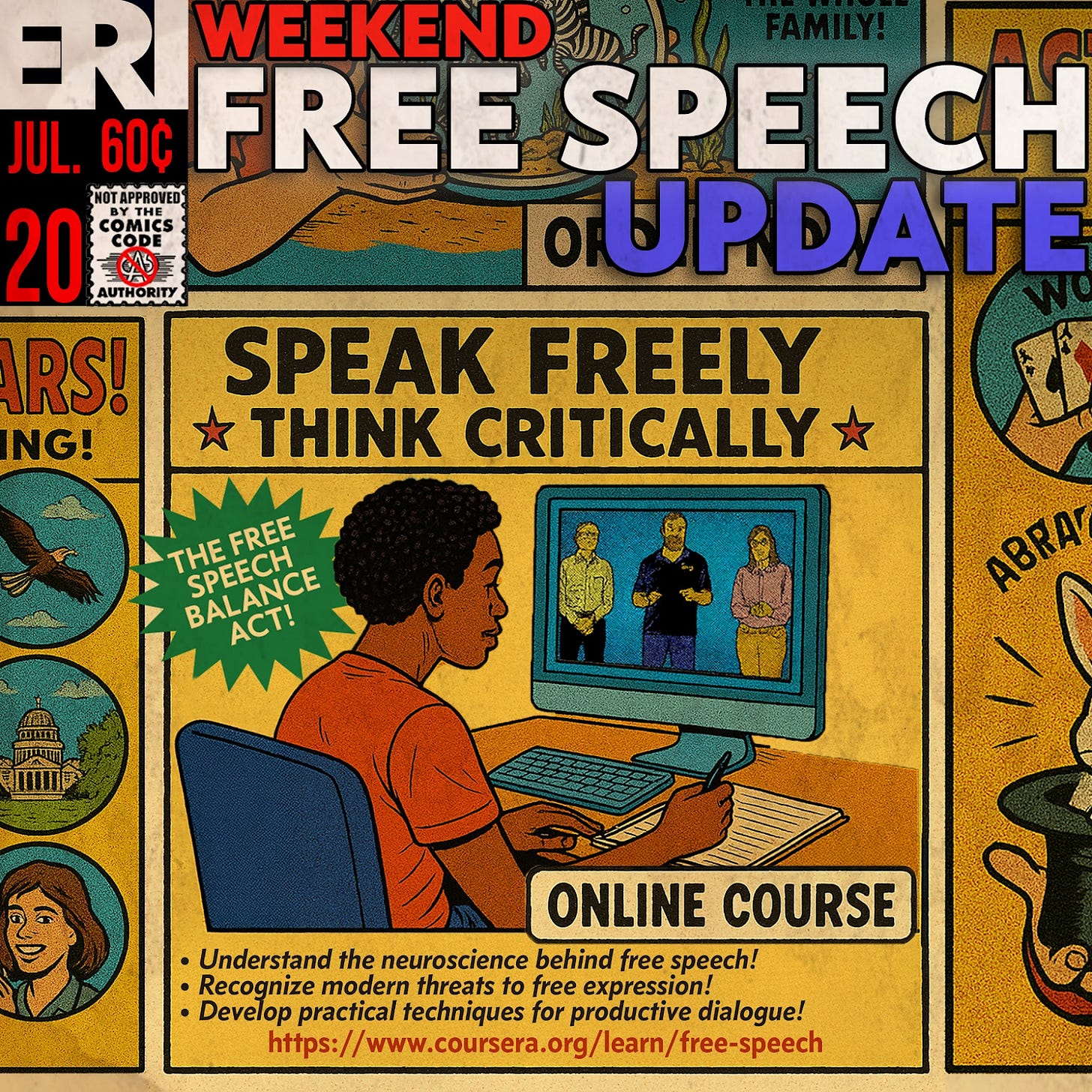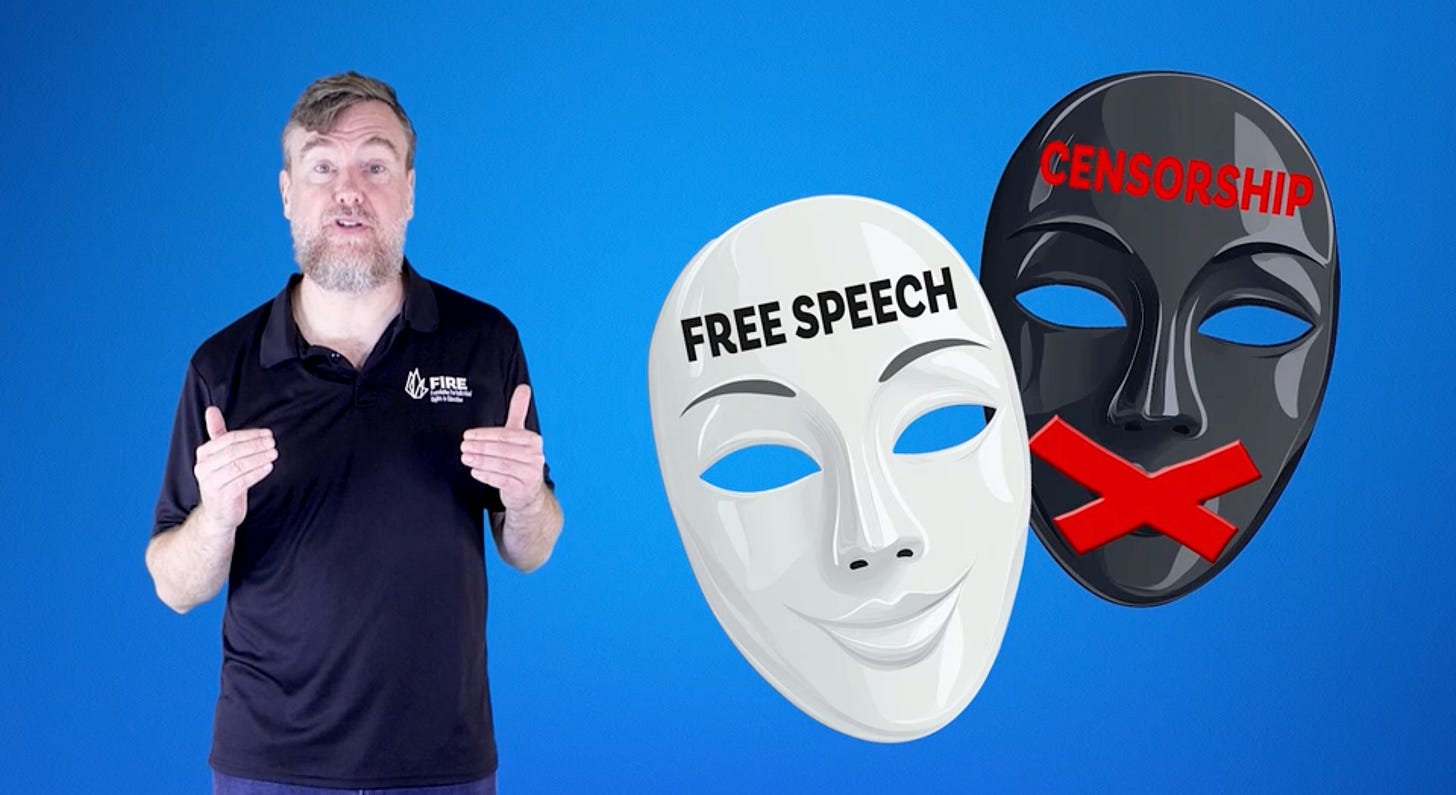Barbara Oakley launches MOOC feat. yours truly, me on the 'Prof G Pod' w/ Scott Galloway, the state of free speech (somehow) worsens in the UK, & more!
Bringing you the latest free speech news (7/20/25)
Story of the week
A new Coursera course on free speech!
More than a year ago, I was approached by the renowned and pioneering online educator, Dr.
, to contribute to a massive open online course (MOOC) that would explore the intersection of free speech and neuroscience with her and Dr. Terrence Sejnowski. This was music to my ears, because the connection between free speech and neuroscience was actually something I’d been thinking about for years (and something which I plan to write more on in the future)! Fast forward to this past January and I was hopping on a plane down to Florida to record my segments in person with Barbara.And now, I’m thrilled to announce that our course (also featuring the brilliant neuroscientist, Cristina Koppel, and with contributions from the constitutional law expert,
) is available on Coursera and entirely free of charge! I’m extremely pleased with how it turned out (Barbara put so much thought, care, time, and effort into it!), and I’m excited to see it bring some of my thinking on the essential importance of free speech to the process of knowledge creation to new audiences. I hope you’ll check it out!This week in Expression
This week in FIRE’s blog
Free Speech Forum empowers next generation of First Amendment heroes by FIRE Summer Interns Eli Kronenberg, Suhani Mathur, and Matt Rigby
London Calling: Ronnie’s First Amendment Roundup
After SCOTUS reverses appeals court by holding NRA plausibly alleged NY’s Financial Services regulator violated the First Amendment by threatening NRA’s insurers and underwriters, the Second Circuit holds again that NRA still can’t get damages
File under “Wait? What?” Last Term, the Supreme Court unanimously reaffirmed in NRA v. Vullo its 60-year-old precedent from Bantam Books v. Sullivan that state officials cannot use third parties to censor private speech—but this week, the Second Circuit held on remand that NRA can’t get damages for the First Amendment violation because, ostensibly, “no case … had clearly established, by the time of Vullo's conduct, that exercising regulatory power to pressure third-party regulated entities into refraining from nonexpressive activity and disassociating from a [speaker] crossed … from persuasion into impermissible coercion and retaliation.” The NRA had sued Vullo, former superintendent of New York’s Department of Financial Services, on grounds she violated the First Amendment with a series of thinly veiled threats against NRA’s insurer/financial business partners to pressure them to sever ties because she opposed NRA’s advocacy. The trial court refused to dismiss the case because accepting the allegations as true, Vullo’s actions could reasonably be interpreted as threats of retaliatory enforcement against regulatees who failed to drop the NRA, and as such she could not claim qualified immunity from damages as “the law was clearly established at the time that First Amendment rights could be violated by the chilling effect of governmental action that falls short of a direct prohibition … but that can reasonably be interpreted as intimating that some form of punishment or adverse regulatory action will follow.” The Second Circuit reversed, holding NRA had failed to plausibly allege Vullo crossed the line from trying to convince to coercing, that she was merely investigating, negotiating and resolving regulatory violations, and even if she did cross the line, she was doing her job in good faith and no clearly established law would have suggested otherwise to bar qualified immunity. The Supreme Court in turn reversed, with Justice Sotomayor reaffirming that “a government official cannot do indirectly what she is barred from doing directly,” applying the same logic as used in Bantam Books, and the Court left it to the Second Circuit to “reconsider” its ruling on qualified immunity. But the Second Circuit held firm. It holds the “nexus” between Vullo’s coercion of NRA’s business partners, and her doing so in retaliation for NRA’s advocacy that she disliked, was not as present here as in prior cases finding First Amendment violations, so the law was not clearly established that she was violating NRA’s rights. Which is weird, because the Supreme Court had said it was only reaffirming Bantam Books and "what it said then: Government officials cannot attempt to coerce private parties in order to punish or suppress views that the government disfavors.” How that failed to put Vullo sufficiently on notice to allow the NRA to pursue damages is thus hard to fathom.
International free speech stories of the week
More than 70 arrests at Palestine Action ban protests (BBC) by Cachella Smith
Reddit’s UK users must now prove they’re 18 to view adult content (Ars Technica) by Jon Brodkin
Turkish court sentences Erdoğan’s top rival to almost 2 years in prison (Politico) by Yurii Stasiuk
Commission’s guidelines for online child safety target platforms of all sizes (Euractiv) by Anupriya Datta
Council renews efforts to fine people for swearing (BBC) by Christian Fuller
A council in Kent is renewing its efforts to introduce fines for people who are caught swearing in public.
Thanet District Council last summer planned to enforce a public space protection order (PSPO), which aims to target anti-social behaviour, including foul language.
Podcast of the week
I was thrilled to be invited to record an episode of “The Prof G Pod” with Scott Galloway. We talked about cancel culture, free speech, and how social media has “supercharged” the age-old inclination toward censorship. Enjoy!









Many people published anonymous pamphlets in the run-up to the American revolution. Apparently there was little effort to censor these tracts. Or perhaps it was simply impossible to censor them in a time long before the internet and Google.
Any way you look at it, censorship can only be implemented by the people with the power to implement it. And they generally are the people who are being written about. Censorship does not protect democracy, it preserves tyranny.